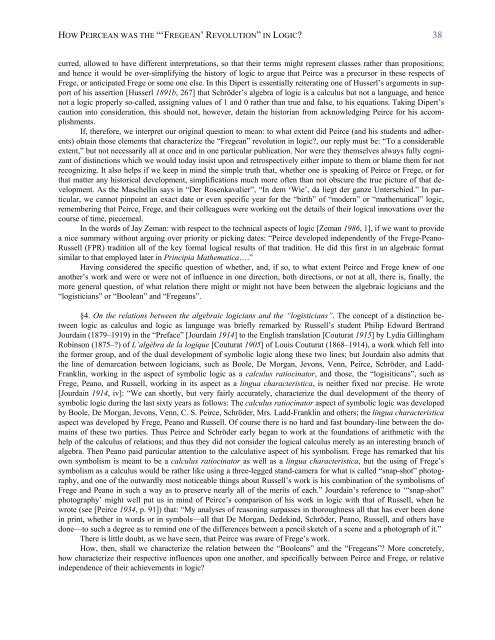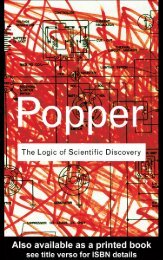Create successful ePaper yourself
Turn your PDF publications into a flip-book with our unique Google optimized e-Paper software.
HOW PEIRCEAN WAS THE “‘FREGEAN’ REVOLUTION” IN LOGIC? 38<br />
curred, allowed to have different interpretations, so that their terms might represent classes rather than propositions;<br />
and hence it would be over-simplifying the history of logic to argue that Peirce was a precursor in these respects of<br />
Frege, or anticipated Frege or some one else. In this Dipert is essentially reiterating one of Husserl’s arguments in support<br />
of his assertion [Husserl 1891b, 267] that Schröder’s algebra of logic is a calculus but not a language, and hence<br />
not a logic properly so-called, assigning values of 1 and 0 rather than true and false, to his equations. Taking Dipert’s<br />
caution into consideration, this should not, however, detain the historian from acknowledging Peirce for his accomplishments.<br />
If, therefore, we interpret our original question to mean: to what extent did Peirce (and his students and adherents)<br />
obtain those elements that characterize the “Fregean” <strong>revolu</strong>tion in logic?, our reply must be: “To a considerable<br />
extent,” but not necessarily all at once and in one particular publication. Nor were they themselves always fully cognizant<br />
of distinctions which we would today insist upon and retrospectively either impute to them or blame them for not<br />
recognizing. It also helps if we keep in mind the simple truth that, whether one is speaking of Peirce or Frege, or for<br />
that matter any historical development, simplifications much more often than not obscure the true picture of that development.<br />
As the Maschellin says in “Der Rosenkavalier”, “In dem ‘Wie’, da liegt der ganze Unterschied.” In particular,<br />
we cannot pinpoint an exact date or even specific year for the “birth” of “modern” or “mathematical” logic,<br />
remembering that Peirce, Frege, and their colleagues were working out the details of their logical innovations over the<br />
course of time, piecemeal.<br />
In the words of Jay Zeman: with respect to the technical aspects of logic [Zeman 1986, 1], if we want to provide<br />
a nice summary without arguing over priority or picking dates: “Peirce developed independently of the Frege-Peano-<br />
Russell (FPR) tradition all of the key formal logical results of that tradition. He did this first in an algebraic format<br />
similar to that employed later in Principia Mathematica….”<br />
Having considered the specific question of whether, and, if so, to what extent Peirce and Frege knew of one<br />
another’s work and were or were not of influence in one direction, both directions, or not at all, there is, finally, the<br />
more general question, of what relation there might or might not have been between the algebraic logicians and the<br />
“logisticians” or “Boolean” and “Fregeans”.<br />
§4. On the relations between the algebraic logicians and the “logisticians”. The concept of a distinction between<br />
logic as calculus and logic as language was briefly remarked by Russell’s student Philip Edward Bertrand<br />
Jourdain (1879–1919) in the “Preface” [Jourdain 1914] to the English translation [Couturat 1915] by Lydia Gillingham<br />
Robinson (1875–?) of L’algèbra de la logique [Couturat 1905] of Louis Couturat (1868–1914), a work which fell into<br />
the former group, and of the dual development of symbolic logic along these two lines; but Jourdain also admits that<br />
the line of demarcation between logicians, such as Boole, De Morgan, Jevons, Venn, Peirce, Schröder, and Ladd-<br />
Franklin, working in the aspect of symbolic logic as a calculus ratiocinator, and those, the “logisiticans”, such as<br />
Frege, Peano, and Russell, working in its aspect as a lingua characteristica, is neither fixed nor precise. He wrote<br />
[Jourdain 1914, iv]: “We can shortly, but very fairly accurately, characterize the dual development of the theory of<br />
symbolic logic during the last sixty years as follows: The calculus ratiocinator aspect of symbolic logic was developed<br />
by Boole, De Morgan, Jevons, Venn, C. S. Peirce, Schröder, Mrs. Ladd-Franklin and others; the lingua characteristica<br />
aspect was developed by Frege, Peano and Russell. Of course there is no hard and fast boundary-line between the domains<br />
of these two parties. Thus Peirce and Schröder early began to work at the foundations of arithmetic with the<br />
help of the calculus of relations; and thus they did not consider the logical calculus merely as an interesting branch of<br />
algebra. Then Peano paid particular attention to the calculative aspect of his symbolism. Frege has remarked that his<br />
own symbolism is meant to be a calculus ratiocinator as well as a lingua characteristica, but the using of Frege’s<br />
symbolism as a calculus would be rather like using a three-legged stand-camera for what is called “snap-shot” photography,<br />
and one of the outwardly most noticeable things about Russell’s work is his combination of the symbolisms of<br />
Frege and Peano in such a way as to preserve nearly all of the merits of each.” Jourdain’s reference to ‘“snap-shot”<br />
photography’ might well put us in mind of Peirce’s comparison of his work in logic with that of Russell, when he<br />
wrote (see [Peirce 1934, p. 91]) that: “My analyses of reasoning surpasses in thoroughness all that has ever been done<br />
in print, whether in words or in symbols—all that De Morgan, Dedekind, Schröder, Peano, Russell, and others have<br />
done—to such a degree as to remind one of the differences between a pencil sketch of a scene and a photograph of it.”<br />
There is little doubt, as we have seen, that Peirce was aware of Frege’s work.<br />
How, then, shall we characterize the relation between the “Booleans” and the “Fregeans”? More concretely,<br />
how characterize their respective influences upon one another, and specifically between Peirce and Frege, or relative<br />
independence of their achievements in logic?





